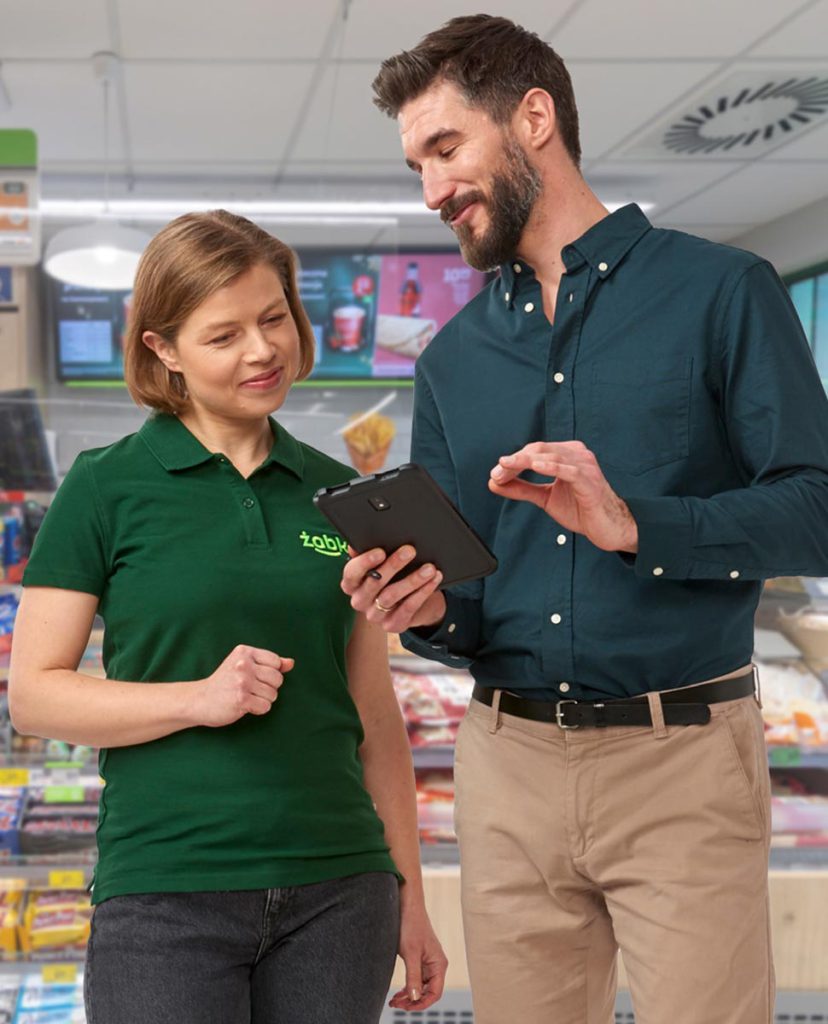Nasze postępy w 2022 roku
W Grupie Żabka kierujemy się najwyższymi normami postępowania i traktujemy przestrzeganie prawa, międzynarodowych standardów oraz wszystkich obowiązujących regulacji, także tych dotyczących przeciwdziałania korupcji, jako podstawowy obowiązek wszystkich pracowników i franczyzobiorców.
Szkolenia w tym zakresie są obowiązkowe i blisko 100% naszej kadry ukończyło je już w drugim roku po wdrożeniu Kodeksu Etyki dla Pracowników. Wszelkie naruszenia Kodeksu są rozpatrywane przez Komisję Etyki, która w razie potrzeby przeprowadza postępowanie wyjaśniające i wydaje zalecenia.
Ponadto wszystkim kontrahentom udostępniliśmy Kodeks Postępowania dla Partnerów Biznesowych, a 35% dostawców (według wartości obrotów) potwierdziło, że przestrzega jego postanowień lub równoważnych unormowań. Co więcej, nałożyliśmy na zespół handlowców i pracowników mających bezpośredni kontakt z dostawcami obowiązek ukończenia kursu online w przedmiocie stosowania Kodeksu.
Przestrzeganie przepisów prawa ochrony konkurencji stanowi dla Grupy Żabka kwestię priorytetową. Przyjęty przez nas model biznesowy opiera się na współpracy z wieloma niezależnymi przedsiębiorcami, w tym – partnerami i franczyzobiorcami. Zdajemy sobie sprawę, że liczba i zakres nawiązywanych relacji narażają nas na ryzyko w tym obszarze. Ponieważ obowiązek przestrzegania przepisów prawa ochrony konkurencji dotyczy wszystkich pracowników i współpracowników, przyjęliśmy szereg dokumentów, które łącznie składają się na Politykę Ochrony Konkurencji Grupy Żabka. Wskazuje ona podstawowe zasady prawa ochrony konkurencji i zawiera wytyczne dotyczące przestrzegania przepisów oraz postępowania w przypadku ewentualnych naruszeń.
Zapewnienie cyberbezpieczeństwa to kluczowy aspekt realizowanej przez nas transformacji cyfrowej, który ma istotne znaczenie dla całej organizacji, jak i jej klientów i partnerów. W 2022 r. do katalogu obowiązkowych programów szkoleniowych włączyliśmy szkolenie z zakresu cyberbezpieczeństwa. Dotychczas ukończyło je prawie 97% pracowników.
O należyte bezpieczeństwo danych dbamy także, stosując system zgodny z normą ISO27001, dotyczącą tworzenia, utrzymania i rozwoju systemów zarządzania bezpieczeństwem informacji. Certyfikat potwierdzający jej przestrzeganie to już nasz piąty certyfikat ISO, obok uzyskanych wcześniej dla norm ISO 9001, ISO 14001, ISO 22001 i ISO 50001, które razem tworzą zintegrowany System Zarządzania Jakością.
Wybrane działania


3.2 Odporne przedsiębiorstwo
Nowe zasady współpracy
Zależy nam, aby proces wytwarzania produktów nie wywierał negatywnego wpływu na gleby, wody ani biosferę, a osoby zatrudnione przy produkcji były pełnoletnie i były traktowane z poszanowaniem praw człowieka, w tym miały zapewnione godne warunki pracy.
Podjęliśmy starania, aby ograniczyć oddziaływania na ekosystemy produktów marek własnych, w tym kawy, herbaty, kakao, soi, ryb i owoców morza. W tym celu wdrożyliśmy Politykę Ochrony Dobrostanu Zwierząt, Politykę Pozyskiwania Surowców Roślinnych ze Zrównoważonych Źródeł oraz Politykę Zrównoważonych Połowów Ryb i Owoców Morza. Wyeliminowaliśmy olej palmowy ze składu produktów marek własnych, a zgodnie z przyjęta polityką w zakresie stosowania oleju palmowego pozyskiwanego w sposób zrównoważony, od 1 stycznia 2023 r. 100% oferowanych przez nas produktów zawiera olej palmowy pochodzący wyłącznie z certyfikowanych źródeł. Wdrożyliśmy także politykę określającą zasady ograniczania zużycia wody i ochrony zasobów wodnych, a także politykę gospodarowania odpadami, której celem jest zmniejszenie ilości odpadów trafiających na składowiska. Jesteśmy w trakcie przeprowadzania analizy ewentualnych czynników ryzyka związanych z działalnością prowadzoną przez nas w bliskim sąsiedztwie obszarów o krytycznie dużej bioróżnorodności o znaczeniu globalnym lub krajowym, której wyniki planujemy w 2023 r. przełożyć na politykę ochrony bioróżnorodności.

dla franczyzobiorców

3.2 Odporne przedsiębiorstwo
Kodeks postępowania
dla franczyzobiorców
Dążymy do budowania kompleksowego systemu etycznego, obejmującego wszystkie aspekty naszej działalności. W tym celu, obok Kodeksu Etyki dla pracowników i partnerów biznesowych, wprowadziliśmy Kodeks Etyki dla franczyzobiorców. Dotychczas podpisało go niemal 97% z nich, a ponad 60% ukończyło dotyczący go kurs e-learningowy. Celem Kodeksu jest pomoc franczyzobiorcom i ich pracownikom w podejmowaniu decyzji zgodnych ze standardami etycznymi przyjętymi w Grupie Żabka. Porusza on takie zagadnienia jak konieczność prowadzenia działalności zgodnie z prawem, poszanowanie praw człowieka, zasady uczciwej konkurencji, konflikty interesów, ochrona środowiska, warunki pracy i płacy czy relacje z otoczeniem. Na potrzeby weryfikacji przestrzegania Kodeksu przez franczyzobiorców Żabka zastrzega sobie prawo do zlecania kontroli niezależnym podmiotom zewnętrznym. Franczyzobiorca jest zobowiązany do zgłaszania wszelkich naruszeń za pośrednictwem specjalnej, przeznaczonej do tego platformy lub w formie pisemnej, wysyłając zawiadomienie do siedziby Żabki, a w przypadku jakichkolwiek pytań dotyczących postanowień Kodeksu pomocą służy Dział Compliance. Osobom zgłaszającym naruszenia gwarantujemy pełną anonimowość.
Nasze polityki w tym obszarze


Kodeks Postępowania dla Partnerów Biznesowych
Jako spółka zdefiniowaliśmy istotne aspekty naszych relacji biznesowych. Przed nami wspólna praca z dostawcami w celu efektywnego wdrożenia zapisów Kodeksu, utrzymując przy tym pozytywne relacje biznesowe, które wypracowaliśmy do tej pory. Proces kompleksowego wdrożenia rozpoczniemy w 2022, a cześć zapisów Kodeksu jest już zaimplementowana w obecnych umowach z partnerami biznesowymi.


Kodeks Etyki i Postępowania dla Pracowników
Kodeks Etyki i Postępowania dla Pracowników jest narzędziem, które może wesprzeć pracownika Żabka Polska, kiedy staje wobec wyboru i chce upewnić się, czy podejmuje właściwą decyzję. Normy i wskazówki zebrane w Kodeksie mają ułatwiać codzienną pracę i być drogowskazem właściwych i etycznych zachowań, w zgodzie z wartościami Grupy Żabka.

Raport Odpowiedzialności 2023




